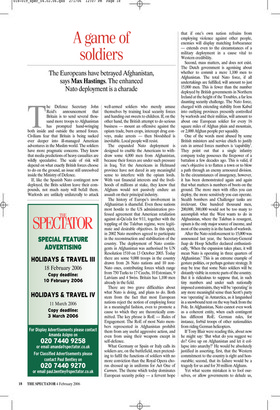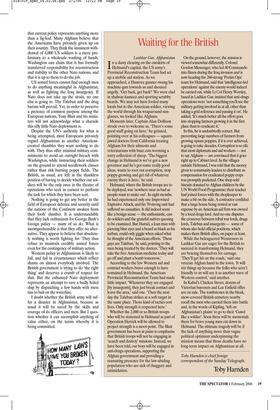A game of soldiers
The Europeans have betrayed Afghanistan, says Max Hastings. The enhanced Nato deployment is a charade The Defence Secretary John Reid’s announcement that Britain is to send several thousand more troops to Afghanistan has prompted hand-wringing both inside and outside the armed forces. Civilians fear that Britain is being sucked ever deeper into ill-managed American adventures in the Muslim world. The soldiers have more pragmatic concerns. They know that media predictions of heavy casualties are wildly speculative. The scale of risk will depend on what exactly British forces choose to do on the ground, an issue still unresolved inside the Ministry of Defence.
If, like the Spanish Nato contingent now deployed, the Brits seldom leave their compounds, not much nasty will befall them. Warlords are unlikely unilaterally to attack well-armed soldiers who merely amuse themselves by training local security forces and handing out sweets to children. If, on the other hand, the British attempt to do serious business — mount an offensive against the opium trade, burn crops, intercept drug convoys, make arrests — then bloodshed is inevitable. Local people will resist.
The expanded Nato deployment is designed to enable the Americans to withdraw some 4,000 men from Afghanistan, because their forces are under such pressure in Iraq. Yet the Americans in Helmand province have not dared in any meaningful sense to interfere with the opium lords. With vast financial interests and the livelihoods of millions at stake, they know that Afghans would not passively endure an assault on their principal industry.
The history of Europe’s involvement in Afghanistan is shameful. Even those nations most hostile to the US administration professed agreement that American retaliation against al-Qa’eda for 9/11, together with the toppling of the Taleban regime, were legitimate and desirable objectives. In this spirit, in 2002 Nato members agreed to participate in the reconstruction and stabilisation of the country. The deployment of Nato contingents in Afghanistan was authorised by UN Resolution 1510 on 13 October 2003. Today there are some 9,000 troops in the country drawn from 26 Nato nations and 10 nonNato ones, contributing forces which range from 750 Turks to 17 Czechs, 10 Estonians, 9 Latvians and 4 Swiss. Britain has 1,100 men already in the field.
There are two grave difficulties about what Nato is doing, and plans to do. Both stem from the fact that most European nations reject the notion of employing force in a meaningful fashion, even to promote a cause to which they are theoretically committed. The key phrase is RoE — Rules of Engagement. The RoE of most Nato members represented in Afghanistan prohibit them from any useful aggressive action, and even from using their weapons except in self-defence.
What Germany or Spain or Italy calls its soldiers are, on the battlefield, men pretending to fulfil the functions of soldiers with no more conviction than the Royal Opera chorus dressed up in uniforms for Act One of Carmen. The theme which today dominates European security policy — a fervent hope that if one’s own nation refrains from employing violence against other people, enemies will display matching forbearance — extends even to the circumstances of a military deployment in a cause vital to Western credibility.
Second, mass matters, and does not exist. The Dutch government is agonising about whether to commit a mere 1,100 men to Afghanistan. The total Nato force, if all undertakings are fulfilled, will amount to just 15,000 men. This is fewer than the number deployed by British governments in Northern Ireland at the height of the Troubles, a far less daunting security challenge. The Nato force, charged with extending stability from Kabul into outlying provinces presently controlled by warlords and their militias, will amount to about one European soldier for every 16 square miles of Afghan plain and mountain, or 2,000 Afghan people per squaddy.
One of the words most abused by some British ministers and service chiefs to justify cuts in armed forces numbers is ‘capability’. They point out that a single infantry company today possesses the firepower of a battalion a few decades ago. This is valid, if one’s objective is to flatten a town or to blow a path through an enemy armoured division. In the circumstances of insurgency, however, it has been demonstrated again and again that what matters is numbers of boots on the ground. The more men with rifles you can deploy, the more sensitively you can operate. Stealth bombers and Challenger tanks are irrelevant. One hundred thousand men, 200,000, 300,000 would not be too many to accomplish what the West wants to do in Afghanistan, where the Taleban is resurgent, opium is the only major source of income, and most of the country is in the hands of warlords.
After the Nato reinforcement to 15,000 was announced last year, the Secretary-General Jaap de Hoop Scheffer declared enthusiastically, ‘When the expansion takes place, it will mean Nato is operating in three quarters of Afghanistan.’ This is an extreme example of gesture politics, or perhaps gesture strategy. It may be true that some Nato soldiers will be distantly visible in remote parts of the country. But it is ridiculous to suppose that, in such tiny numbers and under such nationally imposed constraints, they will be ‘operating’ in any more meaningful sense than Scott’s party was ‘operating’ in Antarctica, as it languished in a snowbound tent on the way back from the Pole. In Afghanistan, Nato cannot even work as a coherent entity, when each contingent has different RoE. German rules, for instance, forbid troops of other nationalities from riding German helicopters.
If Tony Blair were reading this, about now he might say: ‘But what do you suggest we do? Give up on Afghanistan and let it collapse into anarchy?’ He would be absolutely justified in asserting, first, that the Western commitment to the country is right and honourable; second, that its failure would be a tragedy for us and for 30 million Afghans.
Yet what seems mistaken is to fool ourselves, or allow governments to delude us, that current policy represents anything more than a fig-leaf. Many Afghans believe that the Americans have privately given up on their country. They think the imminent withdrawal of 4,000 US soldiers is a mere preliminary to a wholesale washing of hands. Washington can claim that it has formally transferred responsibility for reconstruction and stability to the other Nato nations, and that it is up to them to do the job.
US armed forces cannot find enough men to do anything meaningful in Afghanistan, as well as fighting the Iraq insurgency. If Nato does not take up the strain, no one else is going to. The Taleban and the drug barons will prevail. Yet, in order to preserve a pretence of common purpose among the European nations, Tony Blair and his ministers will not acknowledge what a charade this silly little Nato deployment is.
Despite the UN’s authority for what is being attempted, most Europeans privately regard Afghanistan as another Americancreated shambles they want nothing to do with. They thus offer minimal military commitments to avoid an outright breach with Washington, while instructing their soldiers on the ground to attend needlework classes rather than risk burning poppy fields. The British, as usual, are left in the thankless position of having to decide whether our soldiers will be the only ones in the theatre of operations who seek in earnest to perform the task for which they have been sent.
Nothing is going to get any better in the field of European defence and security until the nations of the Continent awaken from their fools’ slumber. It is understandable that they lack enthusiasm for George Bush’s foreign policy — many of us do. What is incomprehensible is that they offer no alternative. They appear to believe that absolutely nothing is worth fighting for. They thus refuse to maintain credible armed forces even for the contingency of military action.
Western policy in Afghanistan is likely to fail, and fail in circumstances which reflect shame on almost everybody involved. The British government is trying to do ‘the right thing’ and deserves a crumb of respect for that. But the enhanced Nato deployment represents an attempt to save a badly holed ship by dispatching a few hands with mess tins to bail on the waterline.
I doubt whether the British army will suffer a disaster in Afghanistan, because as usual it will be saved by the skills and courage of its officers and men. But I question whether it can accomplish anything of value either, on the terms whereby it is being committed.






























































































































 Previous page
Previous page